
Does Elderberry Help With Allergies? (Start With The Big Question)
If you’ve ever found yourself sneezing non-stop or waking up with a scratchy throat thanks to pollen or dust, you’re not alone — and I’ve been right there with you. For years, I relied on over-the-counter allergy meds that either knocked me out or barely made a dent. That’s when I started hearing whispers about elderberry helping not just with colds and flu… but maybe with allergies too. 🤔
So does elderberry help with allergies? From my experience — yes, in a subtle but steady way. It’s not like flipping a switch, but over time, it felt like my reactions weren’t as severe and my immune system wasn’t going haywire every time spring rolled around.
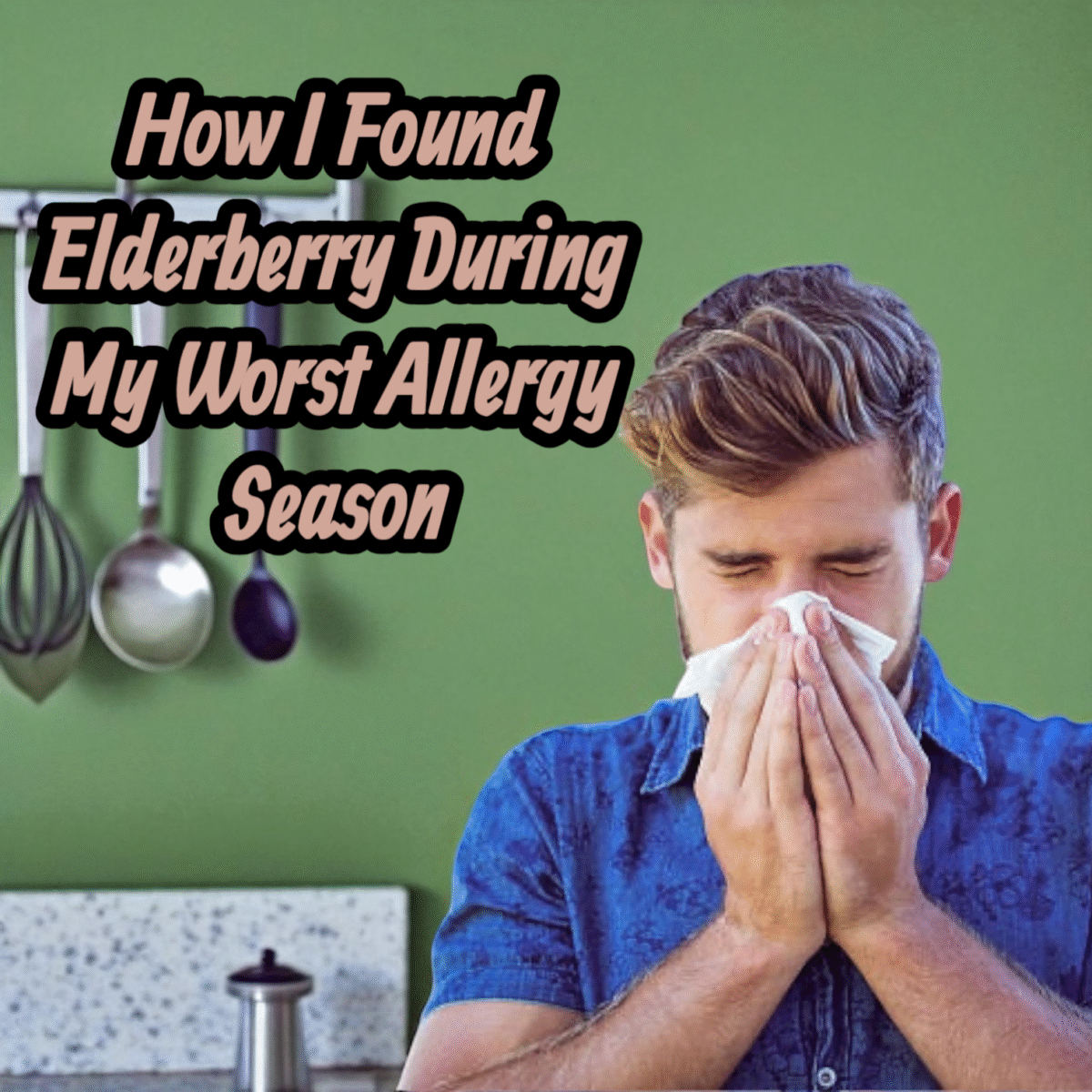
How I Found Elderberry During My Worst Allergy Season
I’m talking itchy eyes, endless sneezing, and the kind of congestion that makes your whole head feel like it’s underwater. Allergy season used to hit me like a freight train every year — until I finally decided to ditch the heavy meds and see what natural remedies were out there.
That’s when I came across elderberry. It wasn’t marketed for allergies directly, but more for immune support and helping the body fight off sickness. I figured… hey, allergies are an immune overreaction, right? Maybe calming that system down a bit would help.
I started with elderberry syrup — then quickly moved to these elderberry gummies that my kids love too. And to my surprise, within a couple of weeks, I noticed I wasn’t reaching for the tissues quite as often.
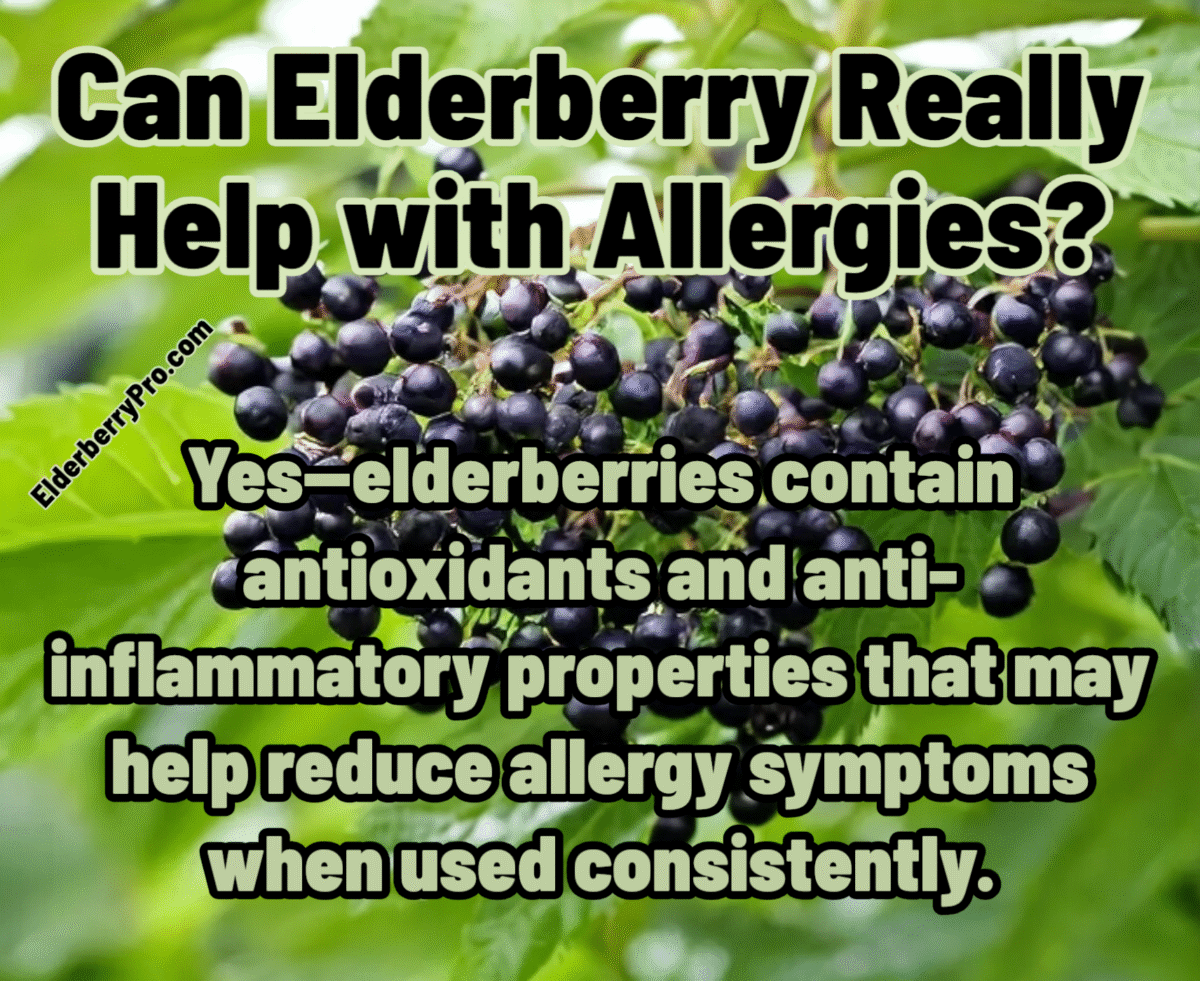
Elderberry 101: What It Actually Does for Your Body
Before we go any further, let’s clear up what elderberry is (and what it isn’t). Elderberries come from the Sambucus nigra plant and have been used for centuries to support the immune system — especially during cold and flu season.
The magic lies in its antioxidants and flavonoids, particularly anthocyanins, which give the berries their dark purple color. These compounds are believed to help regulate inflammation and support your body’s natural defense systems.
So while elderberry doesn’t directly “cure” allergies, it can help balance and strengthen your immune response, which is huge for allergy sufferers.

Allergies and the Immune System: Why Elderberry Makes Sense
Here’s the connection that clicked for me: allergies are basically your immune system overreacting to something harmless — like pollen or pet dander. It sees those things as threats and goes full drama queen trying to fight them off.
So if you can calm the immune system and support it in working more efficiently (instead of going into panic mode), your allergy symptoms may ease up too. That’s where elderberry steps in.
It acts like a gentle immune booster and inflammation tamer — kind of like giving your immune system a cup of herbal tea and telling it to chill out. Over time, this can make a big difference, especially when allergy season kicks into high gear.

Why I Use Elderberry Syrup and Gummies for Allergies
When I started using elderberry for allergies, I didn’t limit myself to just one form. I keep both elderberry syrup and elderberry gummies stocked in the house. Some days I grab a spoonful of syrup, and other days (especially when I’m in a rush or on the go), I pop a couple gummies.
The truth is, both forms can work really well — and my kids? Gummies are the only thing they’ll take without a fuss. They actually look forward to it, especially these children’s elderberry gummies that taste great.
I like the syrup for when I’m feeling a little more stuffed up or when my throat is scratchy. It’s soothing and feels like it coats everything. But I’m not going to pretend I don’t love the gummies too — they make it easy to be consistent, which is the key.

Does Black Elderberry Help With Allergies?
Yes — and that’s exactly what I make sure is in the products I buy. Black elderberry (Sambucus nigra) is the variety you’ll see most often in trusted immune-support products. That’s because it’s been studied the most and shown to have the strongest effects.
If you’re wondering, does black elderberry help with allergies?, the short answer is: absolutely, it can — when used regularly as part of your wellness routine. Whether it’s syrup, capsules, or gummies, look at the label and make sure it says black elderberry specifically.

How Elderberry Fights Inflammation From Allergies
Most allergy symptoms — from puffy eyes to sinus pressure — all trace back to one thing: inflammation. That’s your body reacting to something it thinks is dangerous, even if it’s just a little pollen or pet dander.
Elderberry naturally supports your immune system and helps reduce that overreaction. This is one of the big reasons I use it — I notice I’m not nearly as stuffy or foggy-headed, even during high-pollen months. It’s like it takes the edge off without knocking me out like allergy meds do.
And I’m not alone. People I’ve shared this with have noticed they’re using fewer over-the-counter allergy pills just by adding elderberry to their daily routine.
Real Results: What I’ve Experienced Since Adding Elderberry
Allergies used to wipe me out every spring and fall. Since adding elderberry into my daily routine — both syrup and gummies — I’ve had way fewer flare-ups. I still sneeze here and there, but I don’t feel like I’m dragging myself through the day anymore.
I’ve also noticed that I don’t reach for allergy meds nearly as much. And when I do take them, I don’t have to take them as often or in as high a dose. Elderberry has become one of those go-to habits that just quietly works in the background.
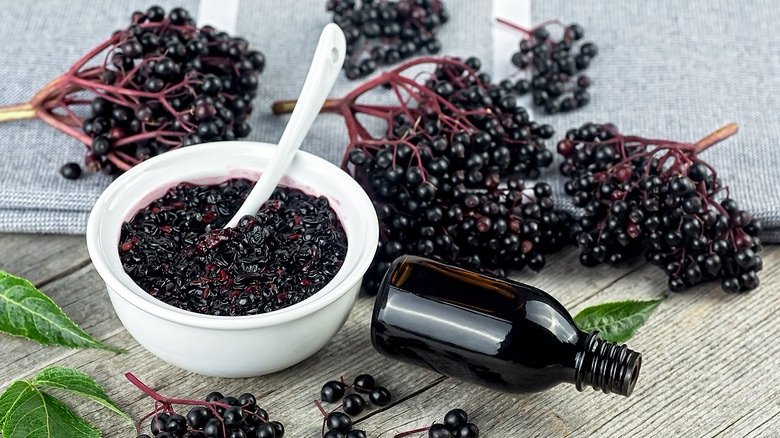
Are There Any Allergy Types Elderberry Doesn’t Help With?
While elderberry can be great for common environmental allergies — like pollen, dust, or mold — it’s not a magic fix for every single type of allergic reaction. If you have food allergies, for example, elderberry won’t stop an anaphylactic response (and it shouldn’t be used in place of an EpiPen).
Also, elderberry isn’t an antihistamine in the traditional sense. It doesn’t block histamine like Benadryl or Zyrtec. Instead, it works more by supporting immune balance and calming inflammation, which can reduce your body’s tendency to overreact to allergens.
If you’re dealing with intense rashes, asthma, or hives that pop up after certain exposures, talk to a doctor — elderberry may help, but it shouldn’t be your only line of defense.
How Long Does It Take for Elderberry to Work for Allergies?
One thing people always ask is: how fast does elderberry actually work? And the honest answer is — it depends.
When I first started taking it for allergies, I didn’t notice a huge difference overnight. But after about two weeks of daily use, I realized I wasn’t blowing my nose every hour and my eyes weren’t nearly as itchy.
Most people I’ve talked to say the same: consistency is everything. Elderberry builds up in your system and works better when taken daily — especially before allergy season kicks in. Think of it like training your immune system to behave, not giving it a temporary command.

Elderberry vs. Traditional Allergy Meds: What I’ve Noticed
Allergy meds have their place — no doubt about it. But I’ve always hated the side effects: the grogginess, dry mouth, and feeling like I’m walking through fog.
Elderberry doesn’t do that. It’s not a knockout drug — it’s more like a steady, gentle helper that makes your symptoms easier to manage in the first place.
Here’s my personal breakdown:
- Traditional allergy meds = strong symptom blockers, fast relief, but lots of side effects
- Elderberry = long-term immune support, less inflammation, fewer flare-ups overall
I still keep meds around for the really bad days, but since adding elderberry into my mix, I rarely need them.
What the Science Says: Elderberry and Allergy Relief
So, what does the research actually say?
While most of the studies on elderberry focus on colds and flu, there’s growing interest in how elderberry’s anti-inflammatory and antioxidant properties may help with allergic responses, too.
One study found that elderberry extract reduced swelling and mucus buildup in lab models — two things that are major issues for allergy sufferers. Other research points to elderberry’s flavonoids, which can help regulate immune overreactions.
It’s still an emerging area of science, but based on the real-world results people are seeing (myself included), it’s a promising tool in your natural allergy-fighting toolbox.

Can You Take Elderberry with Allergy Medicine?
This is a question I get a lot, and it’s something I wondered about myself at first. The short answer? Yes, most people can safely combine elderberry with over-the-counter allergy meds like Claritin, Zyrtec, or Allegra.
Elderberry works differently than antihistamines. While traditional meds focus on blocking histamine to reduce sneezing and swelling, elderberry helps support the immune system overall and calm inflammation. So when you combine the two, you’re not doubling up — you’re creating a well-rounded approach.
If you’re looking for other natural allergy solutions to complement your routine, you might want to check out 👉 when to take elderberry for best results – my proven routine 👈 for a full breakdown on timing and combinations.
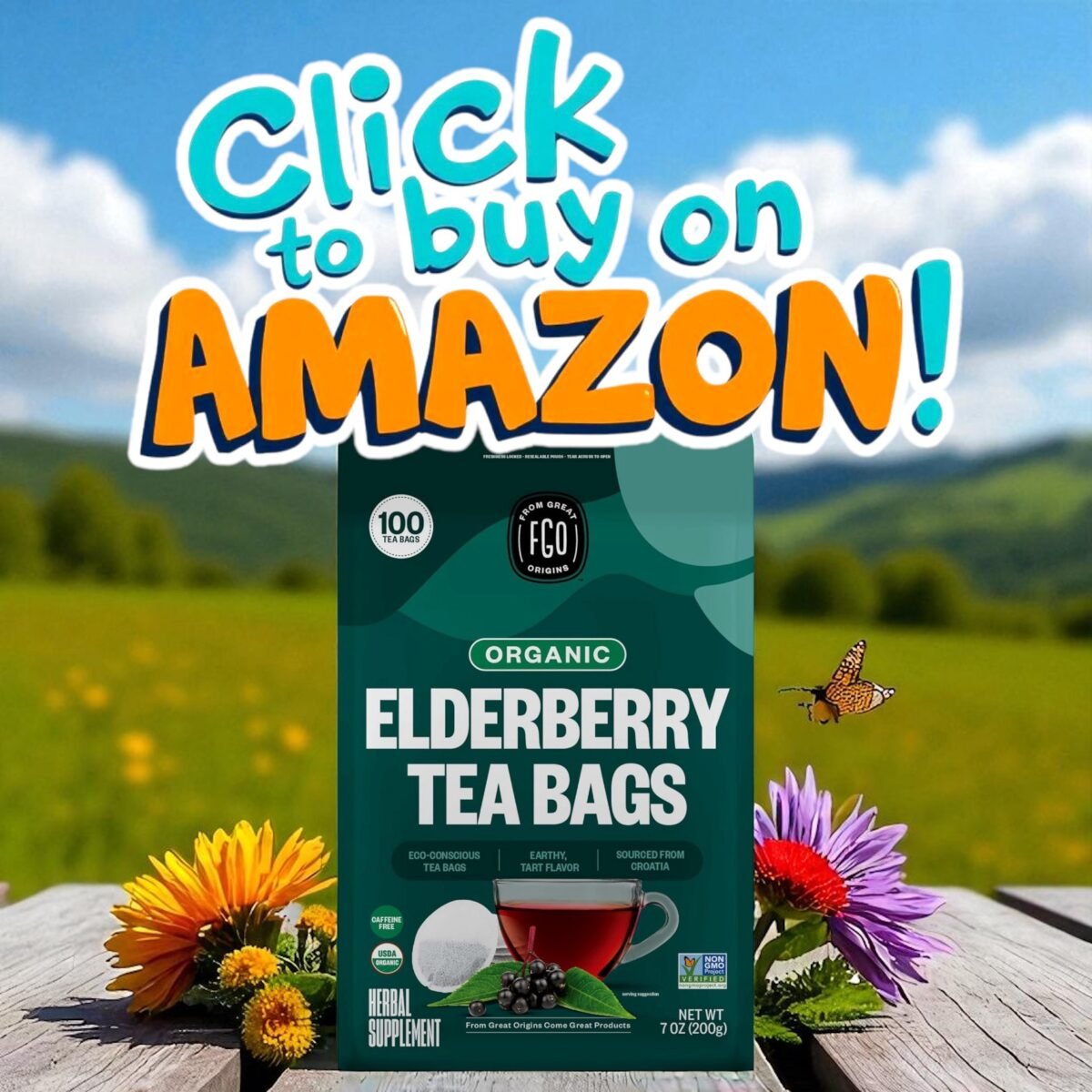
Who Should Avoid Elderberry for Allergies?
While elderberry is safe for most people, it’s not for everyone. There are a few exceptions you should know about:
- People with autoimmune conditions – Elderberry stimulates immune activity, which can sometimes be a problem if your immune system is already in overdrive.
- Kids under 1 year – Just like with honey, elderberry syrup isn’t recommended for babies.
- Folks with severe allergies to plants in the honeysuckle family – While rare, elderberry is part of that family and could trigger a reaction.
If you’re unsure, always check with your doctor. And if you’re curious about how elderberry works in the body or want to try making your own batch, you’ll love our guide on how to make elderberry syrup from fresh elderberries.
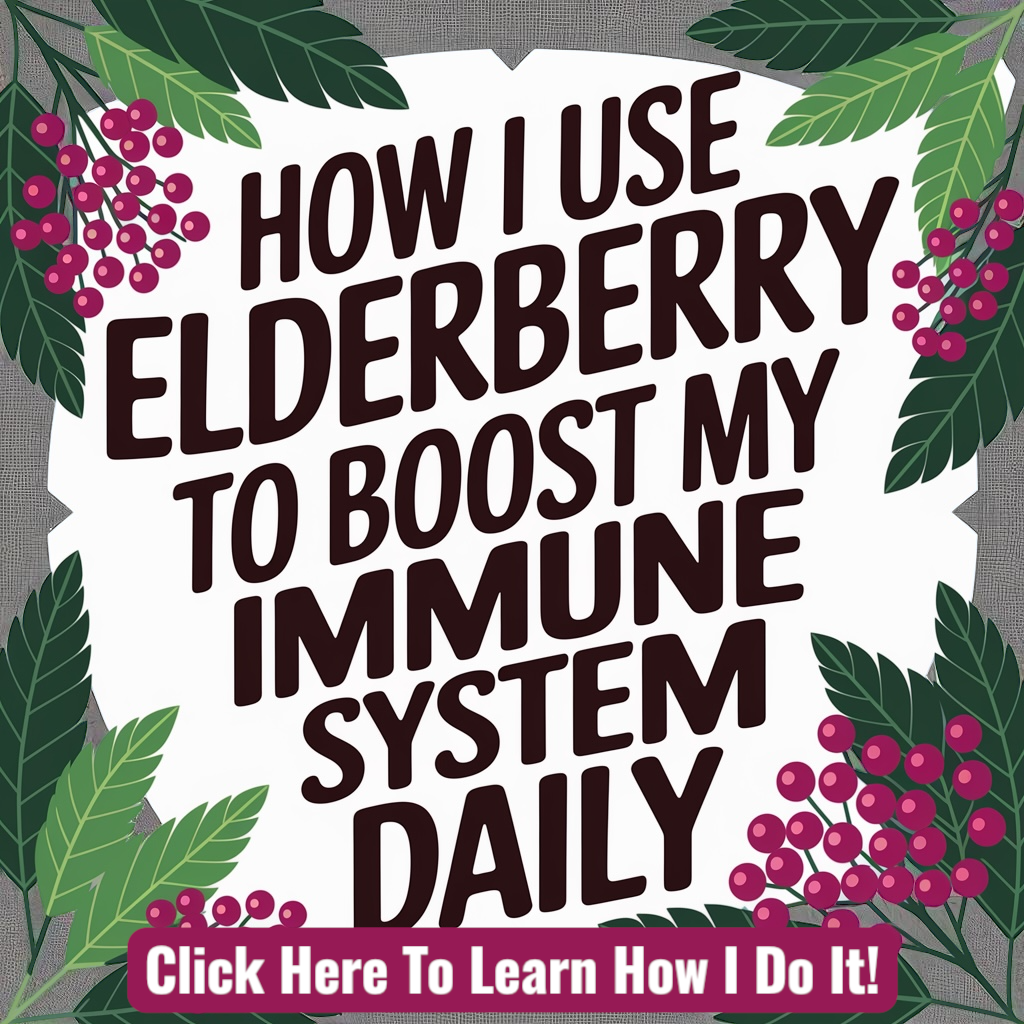
The Best Forms of Elderberry for Allergy Relief
Not all elderberry products are created equal — and when it comes to allergies, some forms just work better than others. Here’s what I’ve personally tested and what might work best for you too:
- Elderberry syrup – This is my daily go-to. It’s fast-acting, easy to adjust your dosage, and feels like a superfood shot every morning.
- Elderberry gummies – If you want something mess-free and kid-approved, these are a game-changer. I throw a few in my bag when I’m on the go.
- Elderberry tea – Perfect for winding down at night and helping clear up nasal congestion before bed.
- Capsules – These are best if you don’t like the taste of syrup or tea. You still get all the benefits, just in a simpler form.
If you’re still torn between options, I broke it all down in this comparison 👉 Elderberry Gummies vs Syrup: Which One Is Better? so you can decide what’s best for your needs.

So, Does Elderberry Help with Allergies?
In my personal experience — and from digging into research and other users’ stories — yes, elderberry can help with allergies. It’s not some miracle cure, but it can be a solid part of your allergy routine. Whether you’re using homemade elderberry syrup or prefer the convenience of elderberry gummies, consistency is key. Just make sure you’re buying or making elderberry the right way — safely and from trusted sources.
For me, adding elderberry in the right form — and at the right time — helped ease seasonal congestion and boost my immune system when I needed it most. That’s why I still keep it stocked to this day.
As an Amazon Associate we earn from qualifying purchases through some links in our articles.